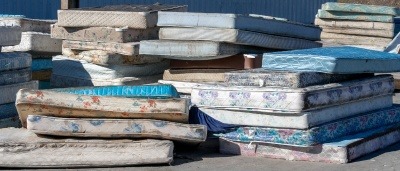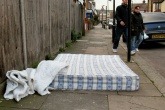The Furniture Recycling Group announces alternative to mattress recycling
The Furniture Recycling Group (TFRG) has announced the launch of a new automated mattress recycling service that will allow lightly-used mattresses to be sanitised and resold.
 Mattress recycling is a time-consuming and expensive process, with most made from a combination of low-value products – like cotton, foam and springs – that have to be carefully separated and sorted before being recycled individually.
Mattress recycling is a time-consuming and expensive process, with most made from a combination of low-value products – like cotton, foam and springs – that have to be carefully separated and sorted before being recycled individually.
As a result, landfill is often seen as the ‘cheapest, quickest and easiest’ option for waste mattress disposal, regardless of the condition they’re in.
In the Purpose Built Student Accommodation (PBSA) sector alone, a high annual mattress replacement rate contributes 1,000 tonnes of waste a year – equivalent to the weight of 481 cars or 504 hippos. TFRG are working to address these forms of mattress waste through collection and recycling deals, and have recently partnered with St Andrews University to help divert its bedding waste away from landfill.
But not all mattresses are disposed of anywhere near the end of their lifecycle, some are exchanged or returned under guarantee to manufacturers and retailers and have to be sent to landfill essentially new – with research from Diver suggesting that more than 200 brand new mattresses are being sent to landfill every day, or 73,000 each year.
It’s these lightly used mattresses TFRG is targeting with its new ‘sanitisation for rejuvenation’ service.
An alternative to mattress recycling
The process uses bespoke machinery developed by TFRG to sanitise mattresses that have been exchanged under a night-comfort guarantee or that have been returned to their provider. TFRG claims that the technology can ‘rejuvenate’ the mattresses to ‘nearly new condition’.
Once they have been cleaned, the mattresses are then sorted, collected and returned to the manufacturer or retailer to be sold. Mattresses collected by TFRG that are in poor condition or at end of life (EoL), will not be rejuvenated, and instead will be recycled in the traditional manner.
TFRG have stated that the industry response to this process has been ‘highly encouraging’, and that some retailers who traditionally have not sold refurbished mattresses have already signed on to the rejuvenation service.
Nick Oettinger, CEO of TFRG, said: “The launch of our rejuvenation service represents a pivotal moment in the recycling and waste management industry.
“We’re not only offering a solution for a more sustainable future, but also changing the narrative around what we perceive as ‘waste’. By rejuvenating lightly used mattresses, we are turning the tide on landfill waste, making strides towards a circular economy, and setting new standards for product responsibility.”
Mattress recycling solutions for student halls
TFRG also provides a recycling service for mattresses closer to EoL, and, as mentioned above, has partnered with St Andrews to help divert the 6.2 tonnes of waste mattresses and bedding materials it produces annually in its student halls.
The partnership has already seen the transformation of over 2,000 mattresses, duvets and pillows into sustainable products after being recycled by TFRG.
“The solution for the PBSA sector lies in creating practical partnerships with professional mattress recycling facilities,” says Ottenger, on the deal. “This not only alleviates the waste issue but also greatly reduces the amount of waste that ends up in UK landfills.”









